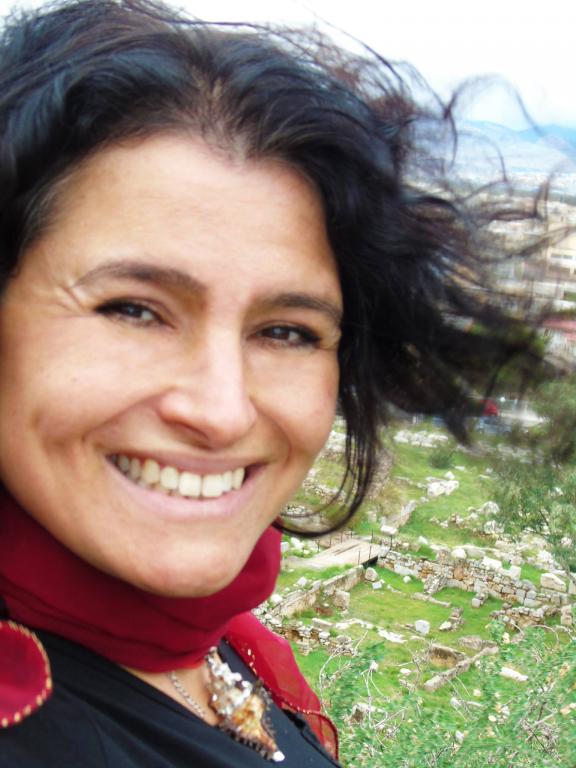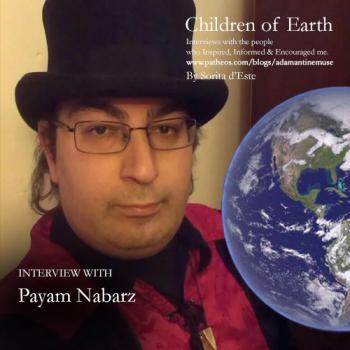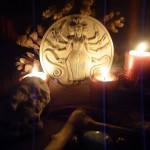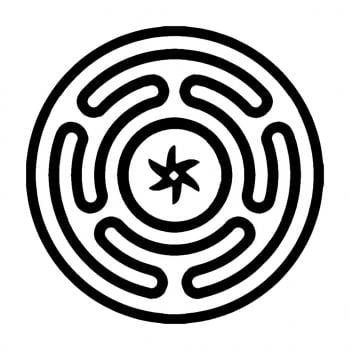In life there are special moments when your life changes forever. Meeting Claudiney Prieto on one of Sao Paolo’s airports in 2014 was one of those moments. I travelled to Brazil on his invitation to speak at CWED (Conferência de Wicca e Espiritualidade da Deusa) on my work, and the people I met and what I learned by just being there changed my perspective on Paganism and Wicca in a very positive way and forever. The passion and love he has for his community and they for him are tangible.
Claudiney Prieto is a Priest of the Goddess. He is surrounded by positive, powerful and passionate people who share his passion for the Gods and Goddesses; and for magic and spirituality. He is a passionate and much-loved teacher and leader, an experienced and skilled ritualist, and an exceptionally well-informed scholar of Pagan and Goddess spirituality.
In this Children of Earth interview I ask Claudiney about his work, the history of the Pagan and Goddess and Wiccan movement in Brazil. We also discuss issues around cultural appropriation or “borrowing” from African Diaspora traditions by Pagans – which is a “hot” topic right now in some circles. We also talk about the confusing influence of the internet on Paganism and how the movement has changed since the late 90s.
Remember: If you enjoy reading this interview, please share it with others and comment if you feel moved to share something ! Also explore other interviews, and articles on Adamantine Muse.
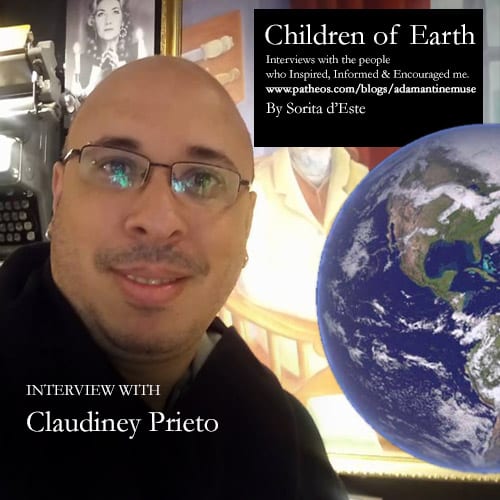
Interview with Claudiney Prieto
Sorita d’Este – The Wicca community in Brazil is well established and growing. When I first visited Brazil I knew a bit about your work and writing, but I knew very little about the Wiccan movement in Brazil. From what I have learned since then I understand it to have been heavily influenced by the Wiccan and Goddess scene in the USA, and that it has a much more eclectic and spiritual approach than what is generally found in the UK and Europe. Of course, these things are continually evolving everywhere, with new influences and ideas coming together. Can you share a little bit about the history and the nature of the Wiccan and Goddess movement in Brazil for those unfamiliar with it?
Claudiney Prieto: There are two main reasons why Brazilian Wicca is strongly influenced by North America. Firstly, the first books about Wicca which were published in Brazil were written by American authors; and secondly the Traditions which first arrived here in Brazil were also from the USA – especially the ones that were strongly influenced by the Goddess Spirituality movements. For example, the Dianic Tradition – which was perhaps the first structured Wiccan Tradition to arrive in Brazil. These two factors had a significant impact on the development of Wicca in our country. And that´s very interesting, because here in Brazil, Wicca is much more focused on the influences brought to the movement from the US. There is a deep connection to the land and rituals that are more spontaneous and intuitive, what some people would call “eclectic” – which is different from my perspective of what Wicca is in Europe, where it still seems to draw much of its influence from Ceremonial Magick. In Brazil, like in the US, we detached from that framework to develop a practice that is much more connected to the Land and therefore perhaps also more Pagan at its essence.
And I find that this is very interesting because it gives to Wicca in Brazil a unique feature. Although it still maintains the influence from Ceremonial Magick and the Western Mystery Traditions – the fertile ground from which it arose during the ’50s and ‘60s – people here were able to create a more singular movement based in their own researches and the resources available at the time. I believe that this generated a spiritual path, or as I call it, a religion, which answers people’s questions about the mysteries of life, has deep connection to environmental issues, the revaluation of women’s role in society and in spirituality – among other essential subjects in these troubled time that we are living globally.
About our history… Wicca arrived in Brazil by the ’90s, and although there might have been people here possibly practising the Craft before that time, there are no reliable records about this. So, it is hard to trace our history before this point in time. What I can say for sure is that Wicca came into the public eye in Brazil during the ’90s, at first through some American books. This brought forth a number of self-initiates who formed eclectic groups with spontaneous practices.
One of the primary factors in the development of Wiccan culture in Brazil was a chain store called Alemdalenda, idealized by my late friend Heloisa Galves, who was a supporter of Wicca. Because of her personal passion for it, she started to invest and bring some of the Wiccan ‘scene’ from America to Brazil. During the beginning of the ’90s the Alemdalenda stores carried many books from American authors. Most of them, perhaps even all of them, came from US publisher Llewellyn, and this paved the ground for Wicca in Brazil. After that, Heloisa started to open the space to talks and workshops, and a small movement of eclectic Wicca started in Brazil, culminating in a larger scale impact in later years, drawing attention from newspapers and magazines. Until then, Witchcraft was seen as something totally folkloric in Brazil and not at all as an established religion.
So, the first gatherings were formed, offering talks and workshops. And in 1998 we had the First Gathering of Witches, in Sao Paolo, that brought people from different parts of Brazil that had met through the Internet. The Internet was also arriving in Brazil at that time and was a vital tool which connected Craft practitioners. There were more than 200 people at that first gathering, and through this event, all of them could see they weren’t alone.
In this gathering, I introduced Abrawicca to others, as the first association for Wiccan practitioners in Brazil. I founded it with the purpose of fighting against the stigmatization of Witchcraft and it would eventually become a very important organism through which the Wiccan community in Brazil would be strengthened. Although I started doing public rituals in 1996, with Abrawicca we offered it through the Association, and through that were able to gather larger groups of people – illustrated that there were already a Wiccan culture and Pagan community in Brazil.
This work was consolidated through the publication of my book “Wicca: The Goddess Religion” in Brazil which became the first best-seller on the topic of Wicca in Brazil. This book offered people a book written by a Brazilian author, sharing the experiences of a Brazilian Witch practising an English religion that had arrived in Brazil from the US. So all the references people had at the time were totally connected to the northern hemisphere. The book gave people in Brazil access to information adapted for the southern hemisphere, with all the necessary changes for it, such as the dates of the Sabbats, for example. Through the book, people felt supported and validated to practice Wicca as religion in Brazil. “Wicca: The Goddess Religion” went on to sell more than 250000 copies, which represents more than a million readers (because here in Brazil we count five readers for each copy sold).
The movement was further consolidated through songs, CDs, conferences and other events offering people a spiritual path different from the patriarchal ones. Today, non-official research suggests that around one percent of the nearly 210 million Brazilians have some connection to Wicca, perhaps not as practitioners, but related to it in some way.
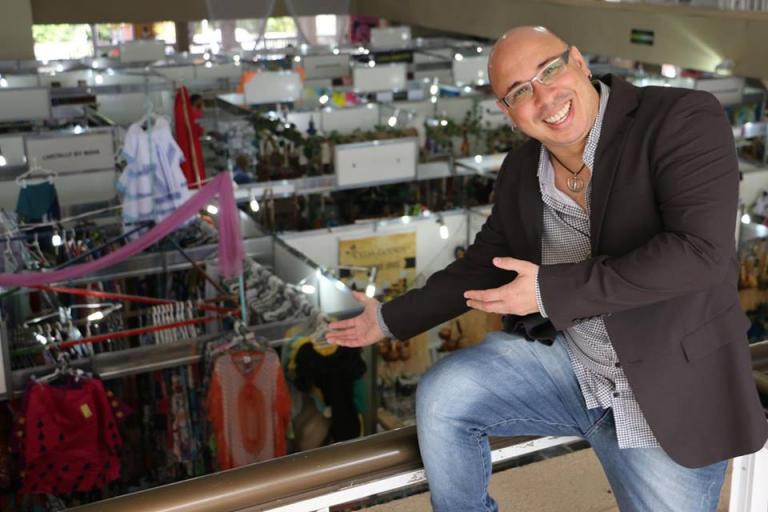
Sorita d’Este – You have written several books on the topic of Wicca and Goddess traditions over the last two decades, which are available primarily in Portuguese. What inspired you to write your first book, and what do you feel you have learned since then?
Claudiney Prieto: I was motivated to write because at that time, the number of books about Wicca available in Portuguese was minimal, and all of them brought a reality based on the practices of Wicca in the northern hemisphere. I felt that none of it made a lot of sense since my own practices had gotten a different outline, and I wanted to share with people my own perspectives, such as not celebrating Samhain – a preparation for the coming winter – in October, when we in Brazil are actually waiting the coming of summer. I wanted to show people that it was possible to follow the natural cycles of our own lands and still practice this foreign spiritual tradition.
In the 90’s I started to offer a study circle about the Craft based on material that I was writing at the time, and eventually, this material got so big that people started telling me “why don´t you take all of that and put it in a book?”. So I offered this material to a small publisher near my own house. During that same period, I was also invited to participate in a very popular interview show in Brazilian television, and the publisher saw in it an opportunity to get a lot of publicity for the book and decided to publish it. While that book did not become one of my well-known books, it was an essential step towards bringing forth the book “Wicca: The Goddess Religion”. I invited Heloisa Galves, from Alemdalenda store, to write the foreword to this very first book, and she told me that she had just signed a contract with a big publisher to create a Wiccan label and translate some of Llewellyn’s books for Brazil and even publish some Brazilian authors. As I had already had signed a contract with the other publisher for this first book, Heloisa invited me to write another and publish it through the new label, and that´s how “Wicca: The Goddess Religion” was born. This book was published in 2000, so it will be its 20th anniversary next year!
All my books came from my desire to communicate with other people and share my own views and experiences of the Craft, which I felt deserved to be shared with the community. It was never my intention to become a well-known author. But I have 15 published books to date which have had considerable influence not only on Brazilian Paganism but also in other parts of Latin America. As Spanish and Portuguese are very close, people bought my book in Portuguese because there were not a lot of options available for them in Spanish at that time.
I have also written books about Rites of Passage that teach how to celebrate each significant phases of our lives, about Coven work, practices and techniques for invoking the Gods, about different expressions of the Divine Feminine and so on. I keep writing because I think that there still is a gap to be filled in terms of Wiccan literature in Brazil.
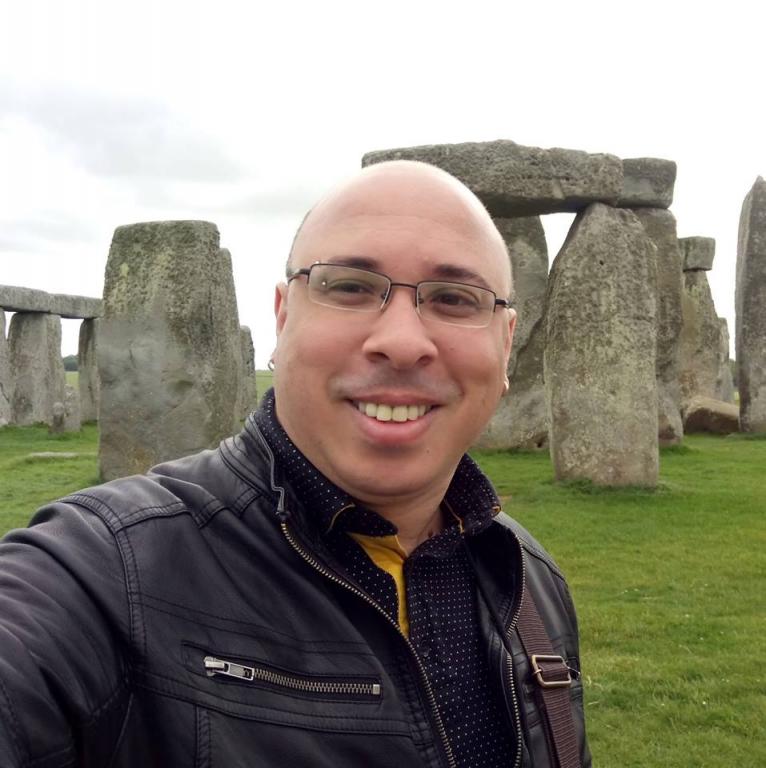
Sorita d’Este – Here in the UK (and Europe) I am often asked why people are interested in Wicca in Brazil when there are other “indigenous” traditions. Why do so many Brazilians choose to explore Wicca rather than traditions such as Candomble or Umbanda?
Claudiney Prieto: I think this type of question shows how it is difficult for people to think globally. People are interested in Wicca, a foreign spirituality, in the same way, they are interested in foreign music, foreign culture, sacred sites of other countries… We are all heirs of a millennial cultural and ethnic legacy from all over the world. Today, we can take a simple DNA test to discover from which parts of the globe our ancestors came from, and most of the time we will be surprised to find that we are a mix of regions we would never suspect… Is it really possible to think that our feeling of belonging is restricted just to our own country´s direct culture?
Most of the religions we have came from foreign countries – Christianity, for example. So, following this kind of thought, how could a person be a Christian outside of Israel? And yet, Christianity is one of the most prominent religions all over the Western world. Christians are worshipping a foreign God, but this fact never seemed to be a problem for many.
Today Wicca is a global religion, and not something practised only by a small group of people in a small city in England. Of course probably what most people practice today is not (so-called) British Traditional Wicca, but rather a type of Wicca per se. We cannot ignore this anymore. Thousands of people in different parts of the globe consider themselves Wiccans practising almost the same thing. If I travel during the time of a Sabbat, for example, I will be able to find a Wiccan group celebrating the festival in Peru at the same time. If I go to Mexico, France, Russia, Germany, or even India, I will also find Wiccans and groups of people that share a similar religious identity. Despite the few little differences in practice and liturgy, for sure there will be a common core (like cast the circle, invoke the quarters, cakes and wine…) that can be recognized by all Wiccans from all Traditions. So, this “new” Wicca is now a kind of “universal” religion.
This type of question, about why Brazilians are interested in Wicca, usually arises from people that have no contact with the Pagan worldwide community and think that Wicca is still something practised only in small and private groups in specific parts of the world. And if these people ever come to Brazil and could witness open rituals with four-, six-, seven-hundred people, all them with a deep connection with the Gods and completely capable of bringing forth the presence of the Gods to a sacred space, I guess they would be really ashamed of making such questions, because they would be able to realize what is actually happening instead of making suppositions and judgments about something they are unfamiliar with. In addition to that, Brazil is a country where most people are direct descendants from Portugal, whose name “Portus Cale” probably indicates some Celtic origin. So, this type of discussion is nonsense because there is a direct blood connection that relates us to European spiritual paths at some point.
So, talking to people that are more emotional than rational, I would suggest them to come and see for themselves the energy that is raised in our rituals and how people in Brazil are deeply connected to these Gods. For the ones that are more rational than emotional, I suggest stop seeing Brazil as a country with origins and influence only in indigenous and African cultures. Those things are also incredibly significant to us, but it is not the only ancestry we have. We also have deep roots in Europe, and because of this ancestral legacy, people here may feel a durable connection to a European religion – by the very blood that runs through our veins.
Sorita d’Este – There is also the idea that the use of psychedelics and other mind-altering substances are central in all magical traditions in Latin America; but in practice, I have found that the majority of sincere practitioners in Brazil are far more sober than their European counterparts! What role do you feel alcohol and drugs have in Wicca and Goddess spirituality today?
Claudiney Prieto: About the use of alcohol and drugs in spiritual practices such as Wicca, we need to think from a historical perspective to understand the culture in which Wicca was born: a society that was fresh out of the Victorian era and yet carrying a lot of prejudice and a repressed core of values. That culture was very conservative, and Wicca has always been a contra-cultural spirituality that offered people an alternative to do and be whatever they could not be in conventional societies. By doing so, at that time, the Covens became refuges for people to be truly free for some moments of their lives.
Back then, Covens were a safe space for people to experience what was impossible in their daily lives. Women could freely consume alcohol without facing judgment; or use specific drugs under the pretence of freeing the mind, for example. I believe that all these are still part of some groups today and that it is a connection to the sense of freedom that people experienced through Wicca at the time, rather than ritualistic purposes only.
However, today drugs and alcohol are present in our societies in a very different way. They represent a global issue, with a vast number of addicts, which should make us rethink about the role it plays in our spirituality now .It is crucial to set aside all the historical contexts of alcohol, for example, the connection of wine to Dionysian rituals and the mythological idea of it as a spiritual essence of the Gods, which definitely is beautiful in a mythological perspective, but we need to reconsider: is it still relevant to our present times or is a danger for many? I really believe that Covens and other Pagan groups should be safe and healthy environments to all their practitioners. That’s why I advocate an extremely safe and conscious use of substances such as alcohol in rituals and do not refuse the idea of refraining from it if I have in my Coven any person that faces problems with this type of substance.
I think this is also the posture of most Wiccan groups in Brazil, and probably it relates at some point to our culture, where although alcohol is accepted in social situations, it isn’t seen as something entirely positive. This is different from other cultures in which the excessive use of alcohol is seen as something completely normal in regular social situations. This position is probably due to our own history of alcohol abuse and related violence, which has created many familiar and social problems. It has even led the government to develop many social programs to deal with this issue, in an attempt to make people realize how many problems arise from smoking and drinking.
In Brazil we won’t see people having bottles and bottles of wine before, during and after circles; what we see in most groups is that during the whole meeting, considering the preparation time before and after the ritual, ten or thirteen people will consume only two bottles of wine. Personally, I think this is great, because it leads people to develop other methods and techniques using body and mind to attain ritual ecstasy, after all, the goal of our circles is not to socialize, but to develop our spirituality. If you want to get drunk, you can do this on other occasions in your social life. You don’t need a circle for that.
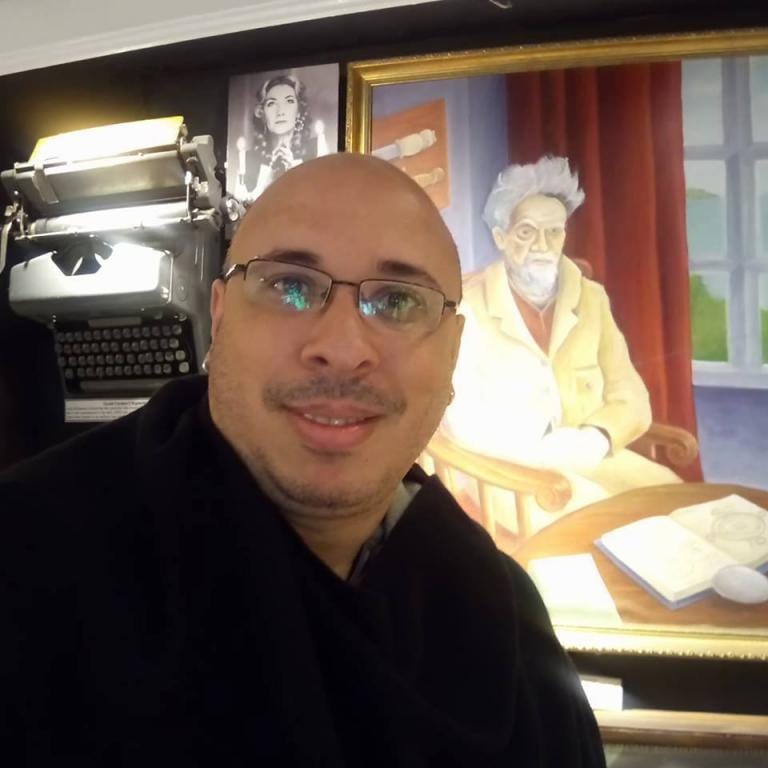
Sorita d’Este – In Brazil, and I believe now also in the USA, there is a growing tendency for individuals to mix practices from African diaspora religious traditions, with contemporary Pagan practices. While most of the time this is because of a genuine feeling of connection to the diaspora traditions or because of an innocent understanding that this brings authenticity to the Western traditions; this mixture can also lead to some incredibly weird misunderstandings. I have seen some adaptations which are so disrespectful it would be considered profane in all the traditions drawn from, others which are so bizarre it is peculiar and funny; but I have also heard that there instances where such mixtures are created for the purpose of profit or abuse. What advice would you give to someone who is thinking of mixing a tradition such as Candomble, Quimbanda or Voudon with Wicca and the Goddess traditions?
Claudiney Prieto: I believe most of this tendency to mix different systems comes from the fact that many people have a shallow relationship with the pagan path they practice. Nowadays most people do not want to undergo formal training inside Coven; instead they research material by themselves. Although there are many books available, most of them are merely introductory texts and offer limited information to the seekers, and it gives people the feeling that their spiritual experience is inadequate or incomplete – that’s why they rely on other spiritual Traditions to fill the gaps.
And as African diaspora religious traditions are closer in some way to what we do in Pagan religions than most other spiritual paths, people believe they are somehow linked and that it is possible to copy or mix some of their techniques to Neopagan or Wiccan practices. But I believe that it is a mistake to think that there are formal techniques on those religious systems that can be learned and reinterpreted by Wiccans who are outsiders. There are not. All the religious and mystic experiences in Afro Diaspora religions are entirely spontaneous, intuitive and guided directly by their egregore, unlike Wicca in which we do learn techniques in formal training for everything we do in ritual.
I was raised in Candomble, an African diaspora religious tradition. I practised Candomble as my religion for many years before I became Wicca, so I know and understand the spiritual phenomena in it first hand – including possession by a deity and the relationship between people and their Gods. These are entirely different from Neopagan Traditions.
I really believe that in a world where we cherish so much for the land, its diversity and different cultures, people should be a bit more responsible in the way they steal elements from other spiritualities and adapt it to their own.
And here is necessary to say that this is entirely different from what we do in Neopaganism, drawing inspiration from previous religious systems that no longer exist to incorporate them in our modern practices. My criticism is directed explicitly to the inappropriate use of religious systems that still exist and are still practised, such as Umbanda, Candomble, Buddhism, Hinduism… these are living traditions, following rituals and forms of worship which are proper to each tradition. That´s totally different from deities such as Venus and Isis, where there is no continued worship and where their worship was reawakened. Living Traditions preserve ritual and methods taught by the deities to humans.
I believe that people who say they feel an inner calling to African diaspora religious traditions, and for this reason take some of its elements to complement their own Neopagan religions, are actually doing it, most of the time, because they do not have a deep connection to the Neopagan traditions themselves. If they had, they would find a depth of experience in the system they are currently practising, with no need to bring elements from other traditions to fill the gaps of their own experiences.
Sorita d’Este – In recent years you founded the Sanctuary of the Great Mother (Santuário Da Grande Mãe) in Sao Paolo, a free temple space open to all interested in worshipping the Goddess. I feel very privileged to have visited it on a number of occasions now and to have been invited by you to lead ceremonies to the Goddess Hekate there both last year and earlier this year. It is a very special space for those who visit it and is always very popular based on the number of people who attend gatherings there. Why do you think the Sanctuary is so popular? How is it currently funded and do you have plans for the future?
Claudiney Prieto: The Temple is open to the community from Thursday to Sunday, and we receive on average of 100 to 200 people every week, so it has become a popular place for Wiccans in Sao Paolo. I believe the Temple has filled an important gap in the Pagan community here by providing a free space for spiritual contemplation.
The idea to create the Sanctuary came to me while I was in Encinitas, San Diego, visiting Yogananda’s Temple. When I arrived there, I saw many people contemplating spiritual symbols on the wall with a powerful sense of inner peace. That vision touched me deeply and I thought: “The Wiccan community should have a space such as this one, with no commercial goals, where they are able to enter freely to have a moment of spiritual connection to the sound of peaceful music, incense and candles.”
After this first glimpse on the idea of a public Wiccan temple, two years have passed until I saw a property and thought “this would be the perfect place for it”. During the ’90s, that place was used for Cabala practices run by two women and named as “Shekinah’s Centre”. These two women were there for almost 30 years, and after they moved out, it became a commercial place with no connection to spirituality. When I saw that this was available for rent, it brought me some memories from my teenage years, when I was still a spiritual seeker and used to pass by that place and imagine what would happen there. So, I decided to apply to rent this. And then, one week later the place was already rented to accommodate the temple. Two months later, we opened it to the community. It has been opened for two years already.
Many Pagans in Brazil, especially teenagers and young adults who still live with their families, aren’t able to practice their pagan spirituality inside their own houses because of their family’s religious backgrounds, and sometimes it creates serious problems in their relationships. So, a place like the Temple is very important to welcome those people and allow them to have a moment for spiritual connection. There, they can light a candle or an incense stick, read books, meditate and also attend to religious services we offer to the community every week.
It is also a place where people who want to learn more about Witchcraft can meet others and find out about specific Traditions because the Temple isn´t restricted to only one form of Witchcraft. In there, services are offered by Dianics, Gardnerians, Alexandrians, Feris, Priests from Fellowship of Isis, Goddess-Oriented Priestesses and others with no label for what they do, but that still can contribute to the larger community in some way. The Sanctuary of the Great Mother is a place of diversity and has become a place where also academics and the media go to find out more about our religion.
Today it is financially sustained by me, and spiritually by many Priests and Priestesses from different Traditions that voluntarily offer open rituals, meditations and spiritual contemplations every week.
Sorita d’Este – Paganism has changed a lot during the last 20 years. The internet and the publication of books on a broader range of subjects and traditions than ever before are making it, theoretically, more accessible than ever before for people to find. What advice would you offer someone who is just starting to explore Pagan and Goddess traditions?
Claudiney Prieto: The internet has completely changed our lifestyle. Today, people buy online instead of going to shops, for example, and they prefer to get information online than buying books. If it even changed our way to meet potential people to have love relationships with, it has also changed the way people practice and learn about their spirituality. The Pagan community we have today in Brazil was born from the internet. In 1996, when the internet was arriving in Brazil, I started to offer public rituals, and we used the online space to find people who were interested in Witchcraft. That’s how we would plan gatherings, study together, have discussions on theology… most of it was done online due to geographic distance.
But comparing to what I observe nowadays, I can say that if in the past we would use the internet to meet in person people who shared the same interests, today people who already know each other use the internet even to do online rituals; something that didn´t exist back then. I’m not here to say if these rituals are effective or not – I think that would be a good talk to another conversation! But today this is a reality all over the world.
And for people that are beginning to explore Pagan traditions, I would say the first source they have at their disposal to study is the Internet, which I do not consider to be very reliable. I still prefer the books as safer sources to get knowledge from. Nowadays many people who are interested in Wicca don´t have a Priest or Priestess to guide them. They rely on their own will as their guide, and I really believe everybody should have a teacher in a moment of life. And maybe if there isn´t a person to take on that role, the books should bethat teacher and avoid Internet. The language of the Internet is always fast and very often shallow; the most seen videos last from 1 to 3 minutes and social media has got people used to read a small number of words. The online space can´t offer the same environment level of information as the books neither create the proper atmosphere to really learn. It is more concerned to a pastime. And that’s why I believe that we shouldn´t take primarily from these sources the knowledge to be the ground of our spiritual experiences.
Even if we read e-books in our cell phones, we still need to deal with all the apps and their notifications that fight for our attention, so I really believe that only physical books can offer us a moment that is specifically dedicated to learning about our spirituality. Books are carefully prepared by many people to offer this deep experience, in contrast to the material we see available online that many times we even don’t know who wrote them.
So my advice for beginners is to use the internet to interact and find people who share the same interests, but when searching for knowledge about your religion, if you are not lucky enough to have someone to guide you through a regular and formal training, stay away from the Internet and go to the books of reliable authors who have gone through formal training and are consistent enough to share their experiences with you. By doing so, you will be able to build strong foundations for your spiritual experiences. If these foundations aren´t solid enough, it can compromise their development and even future learning experiences. That’s why we see many people taking from different and incompatible sources to nurture their practice: the lack of solid ground with consistent information.
There is also another aspect of reading: after some time, when we are familiar with all the basic elements and common aspects of them, reading everything a second or third time will give us new perspectives and bring new elements that we wouldn´t be able to absorb or realize completely during the first time.
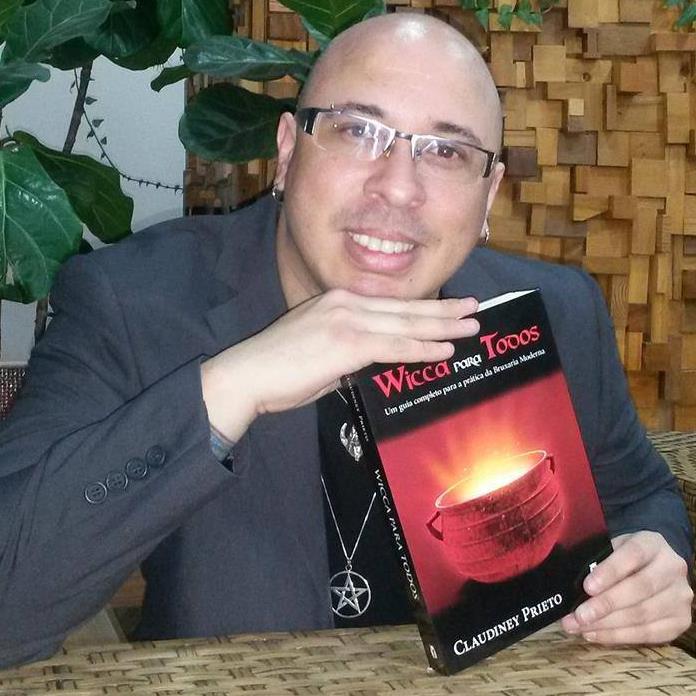
Sorita d’Este – You are involved with several Pagan and Wiccan traditions. Why was it important for you to take on training and initiation in these traditions, and what do you feel you have learned in doing so?
Claudiney Prieto: Initiation in many different Traditions was something life put me through. It wasn´t something I intended, on the contrary. For much time, I thought only one path would give me answers to everything, and I still do not think otherwise. I believe the first pagan Tradition I was initiated answers perfectly all my questions and needs. But many factors have taken me to walk through different paths.
Because my books had a big impact in Brazil, and the Wicca we have here carries a huge influence from them, I feel partially responsible for this community. So I have been initiated in some Traditions to repair problems we had in our own community as a way to offering to people a valid path with a true initiatory lineage when at the time there were many people claiming lineage they actually didn´t possess. Other initiations came from personal seeking or for deep admiration.
Although some of them I have consciously sought, others came surprisingly by divine intention, as my ordination by Z. Budapest that you, Sorita, could witness, and that I wasn´t even expecting. Z. came to Brazil, as many Witches from abroad, to attend to one of our Pagan Conferences, and here, feeling deeply touched by our community, she desired to share this blessing with me and I became the first and only man ordained by her in her Tradition. This is an example of how different Traditions came to my life by different reasons at different times.
I truly believe the Craft is a precious jewel, and that every Tradition is a different facet of this diamond. When you know different Traditions and expressions of the Craft you are able to develop a broader perspective of the whole. So I was lucky enough to be initiated in different paths and to have resources to do so because it demands time, effort, money… and that’s how I brought different Traditions to Brazil. Not everybody here is able to travel due to financial, linguistic, social and other reasons. We all know that initiatory groups are very privet, and sometimes it is difficult to be initiated in a Tradition in our own country. Imagine, then, outside of it. So I took this initiative to make some of them available to people in Brazil.
It is important to emphasize they are all Wiccan or Goddess Spirituality lineages and Traditions. I’m not an initiate of any Pagan path that differs too much from Wicca. And important to say also that all of them speak deeply to my soul. Also, I didn´t receive different initiations just to bring specific lineages to Brazil: in all of them I feel a different type of connection, and all of them are real homes to me. I feel very blessed by the opportunity of being an initiate in nine different Traditions and be able to share them with honest and sincere seekers.
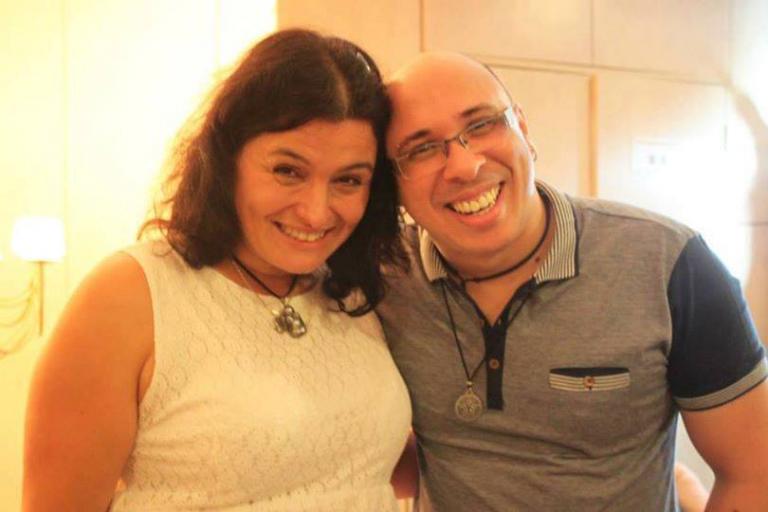
Sorita d’Este – You are the founder of World Goddess Day, celebrated on the first Sunday of September for the last few years. Can you say more about what this is about, where the inspiration for this came from and how readers could get involved?
Claudiney Prieto: The Goddess has always been special to my soul. I became a Witch because of the Goddess, and I have always felt a much deeper connection to the Divine Feminine than to the Divine Masculine. It was the Goddess who changed my way of life and my perspective about the world. She has always been a central figure for me.
Realizing there wasn’t a specific day for people to gather and celebrate Her, although I know that all days belong to the Goddess somehow, I took the initiative to create this date and shared the idea with others: a date not only to people remember the Goddess but specifically to express their love and connection to Her.
So five years ago I invited some people around the world to join this idea, which was marvellously and surprisingly embraced by many people like you, Sorita, and also names such as Z. Budapest, Selena Fox and many other others. So we started to celebrate the World Goddess Day every first Sunday of September.
Originally people would organize official celebrations of the World Goddess Day with local coordination. But two years ago I realized it was a living movement and we stopped the “official” celebrations. Now all celebrations are official. There is no longer a website or a schedule to do it. Any person that feels connected to this date is able to gather some people and celebrate it in their own way.
The idea is that people get together with their communities to create activities and explore their connection with the Divine Feminine and take a moment to teach others that want to learn about this powerful spiritual force that the Goddess represents. Of course, all days belong to the Goddess, and we can celebrate her all the time. But having a specific day to people all around the world expressing the existence of the Goddess is vital because it creates a big impact of thought and visibility to certain topics for the larger society and brings together people with the same frame of mind.
Sorita d’Este – Through the interfaith and other work you do, you meet many spiritual teachers and gurus every year. I imagine that most of them are great, but that every now and then there are people who it would be better to avoid. What qualities do you feel a good spiritual teacher should embody?
Claudiney Prieto: I have attended many interfaith gatherings in my life, and most of the people that are part of them are the ones I least want to avoid. All of them are very dedicated, preoccupied and respectful, looking for dialogue as a tool to create a peaceful culture. Incredibly, I would say that most of the spiritual leaders I try to avoid are within our own community. Fortunately, our community has freedom of spirit, but it eventually creates leaderships that have no specific common shared identities, so you can find different leaders with different thoughts on ethics and values. This is something really difficult, because some of them are reliable people, deeply committed to their spiritual role as models and teachers of new priests and priestesses, while others are extremely frivolous, bringing to the Craft their personal dilemmas and agenda. First, this reverberates on their immediate communities, and after that, on a larger scale.
The main characteristics I would suggest people avoid are the ones I avoid myself: first, toxic people that enter communities to create disagreements. Second, people that are manipulative and try to use their leadership position to manipulate people in all levels: psychologically, emotionally, sexually… Any person that asks you to do something that goes against your personal ethics and human core values is not appropriate to be your spiritual leader. Besides that, people whose stories you are not familiar with, or the ones that are obscure somehow. Every leader has the obligation to share with their seekers and initiates who their initiators are and from which Tradition they come from, or should to be truthful and say that the path they teach is eclectic and based on their own experiences and not lineage. I have also avoided antagonists, the ones that try to oppose all that I say or do all the time. Usually, these are the people that are revealed as false friends or supporters.
I wouldn´t call someone “my priest” or “my priestess” if I couldn´t first call them “my friend”. So, I believe this is the first thing to consider when choosing someone to teach you. I choose to keep a distance from any spiritual leaders I can’t call “friend”. There needs to be a mutual feeling of love, respect, fellowship, loyalty, admiration, compassion and union.
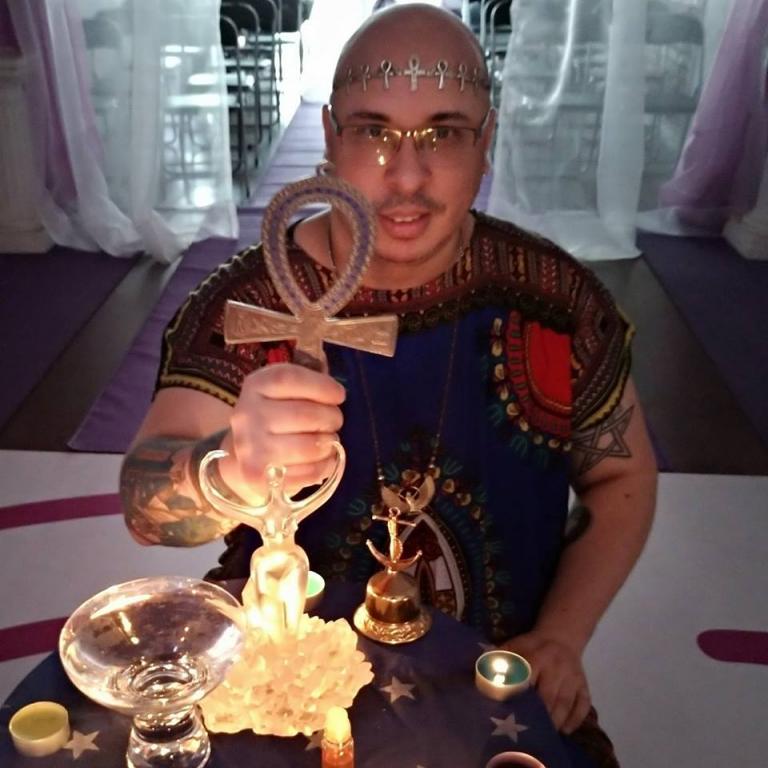
Sorita d’Este – There is so much information on Wicca and Goddess spirituality available today, which means that seekers today have more choices and material available to them than ever before. However, so much of the information (especially on the internet) is conflicting, downright confusing and in some instances simply wrong that it is can also be more difficult than ever for a newcomer to Pagan spirituality to find their way through it all. What advice would you personally offer to someone just starting out on their journey of discovery in Wicca and Goddess spirituality who wants to learn by themselves?
Claudiney Prieto: I have said in a previous question that books can be our masters, so the first thing I think should be avoided is learning only online. Of course, there are good and bad books, but most of the time they are a step ahead from what we see on the Internet.
I also think we should search for information in places which are less accessible, less mass-produced. It is time to turn to groups and traditions, who are able to offer a more structured process through which to obtain knowledge and receive spiritual training. And in this process they will face some problems, they will find great teachers and also shallow ones, but today most people who develop a serious spiritual practice and priesthood training do it offline.
It’s time for people to overcome this tendency for individuality and self-taught learning and strive to find a regular teacher for least once in their lives. All big offerings to the Gods come from personal sacrifice, and the search for knowledge is one of them. Facing the difficulties of finding a proper group and taking in-person training is a symbolic act that represents the offering of our time and energy to the Gods. This is a way to overcome our limitations and the desire to take the easy road. It also shows our commitment to the spiritual path we want to commit to.
I can´t say that all groups are excellent, but I do believe that the best path to spiritual learning nowadays are found inside of them, and not only in books… and the internet forget it. The online environment gives us the illusion that we can have everything we want at any time, and that’s not true.
Sorita d’Este – If you could travel back in time and meet your younger self at the time you were just starting to practice with a small number of friends in Sao Paolo all those years ago, what advice would you give yourself?
Claudiney Prieto: I would tell myself not to waste so much time with the communities’ dilemmas, with people who try to distract me from my path and try to prove that I am wrong. And to rather invest my time on things I believe are right because our hearts are never wrong. Sometimes we get distracted by things that are not important. Personal dramas, gossip, disagreements, the restriction imposed by certain protocols… all of these are not important. So I would tell myself to waste less time, as I do today, and to dedicate more time to myself, my community, my life, my family and son, sharing with all of them the good things my spiritual path brought me instead of being worried about these meaningless quarrels.
Sorita d’Este – How do you hope the Pagan and Wiccan traditions will develop and evolve over the next twenty years?
Claudiney Prieto: I don´t have a specific model of an ideal community in the future. I think we will become what we have to become. The community will become what is necessary to have more dignity and humanity in the world. For me, any type of spirituality is not so much about the divine, but more about humanity itself. We seek the divine in order to understand our humanity. So a spiritual path needs people who value and care for human beings. The world needs a counterpoint, and that’s what our community will become. We live in such a challenging world, and people feel lost and are striving to find their place in it. They are trying to understand who they really are. The world is changing so much and so fast that people feel lost, as if they were dancing out of compass. I think Wicca will become what it needs to become in order to be a positive counterpoint in the world.
But I see a barrier too. Many members of the Wiccan Priesthood don’t understand that change is necessary and instead they want to dictate what Wicca is. Some want it remain static as if it is a relic in a museum, unchangeable by the laws of time. Change is inevitable. Time changes everything, including the things we preserve with deep secrecy and love. Wiccan Priesthood should worry less about what they want to protect and become more concerned about what the Gods want that Wicca becomes. Wicca needs to be what Gods want it to be, not what people dictate.
Trivialities
- Your favourite book of all time?
Julian, by Gore Vidal. - Your favourite character from history?
Hypatia of Alexandria - Your favourite element?
Fire. - Your favourite food?
Pudding - Your favourite number?
Nine, it´s a number that appears a lot of times to me in many situations. - Your favourite planet?
For sure it is the Sun. Although I’m a very lunar person, I love the sun. - Your favourite plant?
Lavender. - Your favourite stone?
Aquamarine. - Your favourite Tarot / Oracle deck?
Old Path. - Your sunsign?
Libra.
Muito Obrigado Claudiney por participar de Children of Earth!
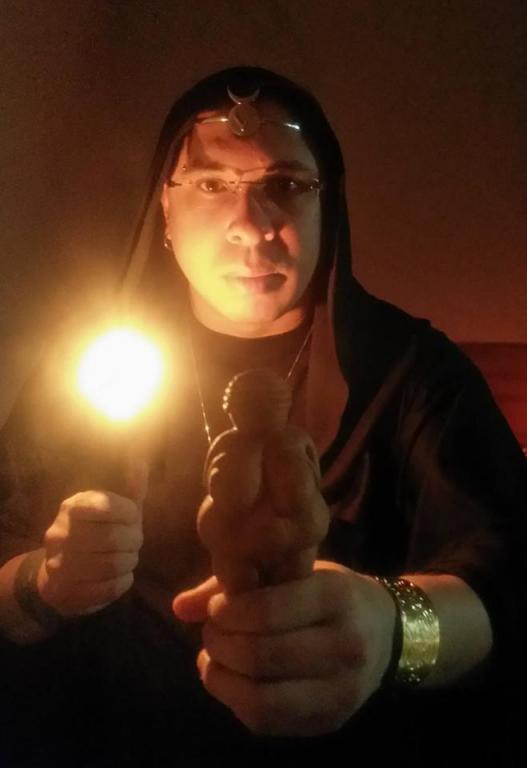
BIOGRAPHY
Claudiney Prieto is a pioneer of Wicca in Brazil and is considered one of the most respected and well-known authors in Brazil who has had more than one book in the Brazilian ranking of best-sellers.
His most famous book, Wicca – The Goddess Religion, sold more than 200 000 (two hundred thousand) copies in Brazil. He also wrote the books ABC of Witchcraft, All Goddesses of the World, Rites and Mysteries of Modern Witchcraft, Coven- Creating and Organizing Your Own Group, Wicca for Solitary Witches, Rites of Passage- Celebrating Birth, Life and Death in Wicca, The Arts of Invocation and Wicca for All.
Claudiney Prieto is the founder of Dianic Nemorensis Tradition (http://www.nemorensis.com.br/) and a High Priest in the Gardnerian Tradition. He is also an ArchPriest in the Fellowship of Isis, a Minos in Minoan Tradition and is the first and only man ordained by Zsuzsanna Budapest.
He was the creator of ABRAWICCA, the first Brazilian Pagan organization, and currently coordinates the Conference & Wicca Goddess Spirituality in Brazil (http://www.conferenciadewicca.com.br/), the largest Pagan event in Latin America with national and international scope, directed for theses, views and discussions on the transformative experiences in Paganism and with the Goddess in her many manifestations.
He is founder and coordinator of the Free University of Pagan Studies (UNILEP), the first online school in Brazil dedicated exclusively to the study of Paganism and Thealogy by correspondence study
In 2014, Claudiney created the World Goddess Day Project (http://www.worldgoddesday.com/), whose objective is reuniting many people around the planet to afford the Great Mother of the world one day of visibility to share Her many myths, stories and diverse forms of worship.
He is also the creator and a Trainer in Goddess Blessing and Goddess Healing, systems of blessing and healing centred in the Sacred Feminine.
Currently, Claudiney devotes most of his time to the organization of MYSTIC FAIR BRAZIL (http://www.mysticfair.com.br/), the world’s largest metaphysical fair, held annually in Sao Paolo and Rio de Janeiro.
~~~
If you enjoyed reading this interview, you may also enjoy reading some of the other interviews in this series I have been doing (and will be doing!) – go to Adamantine Muse for an archive of interviews and articles I have published here on Patheos Pagan.

